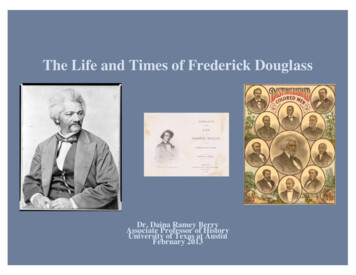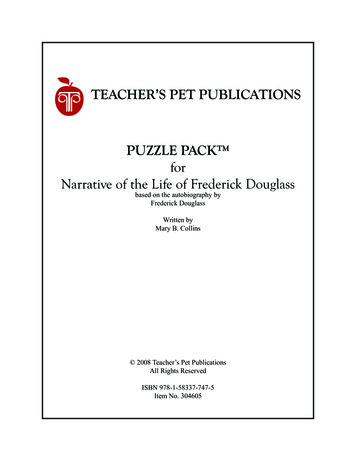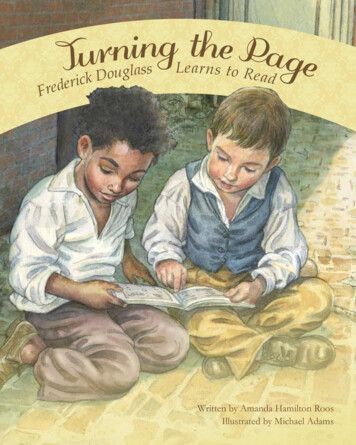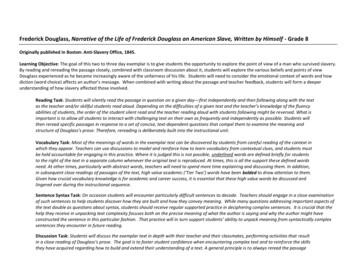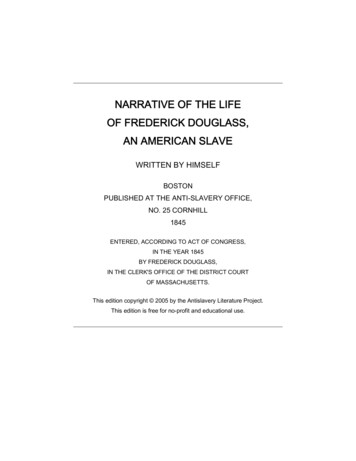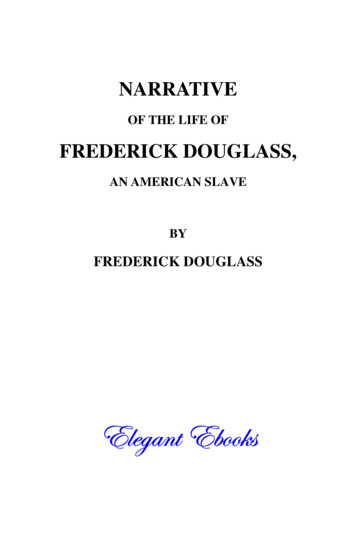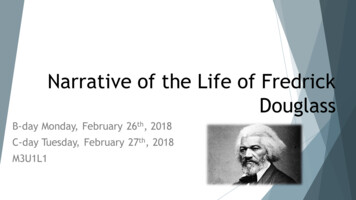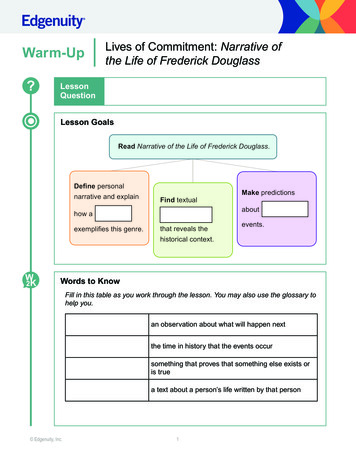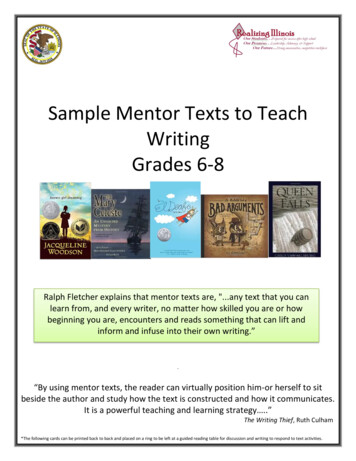
Transcription
Frederick DouglassTalbot County’s Native Son and International HeroCommunity Reading“What to the Slave is the Fourth of July?”by Frederick Augustus Washington Bailey DouglassSaturday, July 7, 2018Presented by the Frederick Douglass Honor Society
Background History of the Occasion“What to the Slave is the Fourth of July?” was the question Frederick Douglassposed to a gathering of 500-600 abolitionists in Rochester, N.Y., on July 5, 1852.At the invitation of the Rochester Ladies Anti-Slavery Society, it was noted by alocal newspaper that when Douglass finished and sat down, “there was a universalburst of applause.” This speech, receiving an overwhelming endorsement, sold over700 copies and would be rememberedas one of most poignant addressesby Douglass, a former slave turnedstatesman.Refusing to celebrate the Fourth ofJuly until all slaves were emancipated, inhis speech, Douglass acknowledged thatthe Fourth of July, a commemoration tothe birth of our nation and anniversaryof the Declaration of Independenceshould be celebrated and the FoundingFather be honored. The dilemma hefaced; however, was that the ideals ofliberty and equal rights for all remainedunfulfilled for blacks enslaved inthe South. In his article, “FrederickDouglass: A Life and Times,” JamesColaiaco writes:Community Reading“What to the Slave is the Fourth of July?”by Frederick Augustus Washington Bailey DouglassSaturday, July 7, 2018Order of ProgramMaster of Ceremonies: Walter W. Black Jr.,Emeritus Board Member, Frederick Douglass Honor SocietySamuel J. Miller, Frederick Douglass, 1852,Daguerreotype. Art Institute of Chicago.“Frederick Douglass inspired, converted, and provoked. He mesmerized hisaudiences. No speaker was more impassioned, more devoted to the advancementof human rights. No person understood better the meaning of the American creedas embodied in the Declaration of Independence and the Preamble to the UnitedStates Constitution, and no one was more eloquent in summoning the nation tofulfill this creed for all, regardless of race”.“What to the Slave is the Fourth of July?” awakened the conscience of thenation, and Douglass’s speech is as much a piercing accounting of nationalhypocrisy on what he referred to as a day of “tumultuous joy” as it is a call toaction.Colaiaco, James A. “Frederick Douglass: A Life and Times.” The History Reader, 1 Feb. and-times-of-frederick-douglassMusical Selections by Tamika WatsonWelcomeOpening Prayer - Rev. Nina Johnson-WrightBackground History of the OccasionMusical SelectionCommunity Reading – “What to the Slave is the Fourth of July?”by Frederick Augustus Washington Bailey DouglassMusical SelectionClosing Remarks
Richard M. Potter, Jr. a resident of Easton, Maryland graduatedfrom Sojourner Douglass College in 2008. Upon completion ofhis undergraduate studies he then matriculated to WilmingtonUniversity and graduated with his master’s degree in OrganizationalLeadership in 2010. Upon graduating Mr. Potter was featuredin a commercial that showcased Wilmington University and hisaccomplishments. He is currently enrolled in a doctorate degreein Higher Education Administration at Morgan State University.Richard serves on numerous boards throughout Talbot County. Healso serves as the President of the Talbot County NAACP Branch.Dr. Clara L. Small recently retired from her professorship inhistory at Salisbury University, where she taught for thirty-sixyears. In 2011, she was appointed to the Maryland Commissionon African American History and Culture by Governor O’Malley.Dr. Small is presently researching the history of African Americanson the Eastern Shore utilizing oral history, official documents,and other sources and is currently serving on the (governorappointed) Governor’s Commission to Coordinate the Study,Commemoration, and Impact of the History and Legacy ofSlavery in Maryland. An accomplished writer, Dr. Small has published and co-authoredseveral books on African Americans who made a lasting impact on this country’s history.She co-authored with Rev. David Briddell “Men of Color, To Arms! Manumitted Slavesand Free Blacks from the Lower Eastern Shore of Maryland Who Served in the CivilWar,”(2010). Her other publications include: Compass Points: Profiles and Biographiesof African Americans from the Delmarva Peninsula, Vol. 1, (2014) and Vol. II (2017)and They Wore Blue and Their Hearts Were Loyal: The United States Colored Troopsof Dorchester County, Maryland, Slaves and Free Blacks Who Served in the Civil War(2016), which she co-authored with Teresa M. Neild.John Ford has been a resident of Easton since 1966, and hasbeen involved in Easton’s town government since 1987. Hewas a member of the Planning and Zoning Commission for 10years, and was elected to the Town Council in 1997, for the last15 years, he has served as the Council President. John Ford’sinterest and admiration for Frederick Douglass stems from theextensive readings he has done on Abraham Lincoln and theCivil War era of American history. Fordstrongly believes that the writings of Frederick Douglass shouldbe required reading in any American history course taught today;as Douglass’s words are as relevant now, if not more so, than whenhe first spoke his truths to America.Bill Peak is the communications director for the Talbot CountyFree Library. He is also a proud and long-time member ofthe Frederick Douglass Day committee. Bill’s library columnis published on the first Sunday of each month in The StarDemocrat. A collection of his columns, entitled Adventures in Shelving, was publishedby the library board in 2016. Other works include the award-winning novel, TheOblate’s Confession. Bill received his undergraduate degree from Washington and LeeUniversity and his Master’s from the creative writing program at Hollins University. Heis known around town as “the Library Guy.”Tamika Watson With the exception of being born in the Nation’scapitol, Tamika Watson has been a Marylander all her life. Shewas initially reared in the suburbs of Arnold before relocating andspending her formative years on Maryland’s Eastern Shore. At avery young age, at her grandfather’s side, Tamika started singinggospel tunes in the basement. Her love of music grew, and hassince led her to the Apollo Theater stage, singing lead with a localband (Evolution), and at numerous events in and around theDMV area.The Hill ProjectIn ca. 1787, James Freeman bought a half-acre lot on what were then the outskirtsof the young and growing town of Easton. Here, he and his wife Henny built asmall urban farm and raised livestock. They were the first free black landowners inEaston and some of their descendants still live on The Hill, the historic free AfricanAmerican neighborhood that James and Henny made their home. In June and July2018, archaeologists from the University of Maryland, College Park, Departmentof Anthropology have brought their archaeological field school back for a secondsummer at the Freeman site to better understand what may have been a portion of theFreemans’ garden, uncovered in 2017, as well as the lives of other residents who havelived here over time. The field school is a training ground for the next generationof archaeologists and involves students directly in the research on this importanthistoric site and neighborhood.The excavation is a part of TheHill Community Project, ledby Dale Green of Morgan StateUniversity, and continues alongstanding partnership withHistoric Easton, Inc., and the EastEnd Neighborhood Association.Researching the history of TheHill from the Freemans’ early yearsto the present through artifacts isan exciting way to learn about theeveryday lives of those who havecome before and every excavationsheds new light on this importantcommunity!
“What to the Slave is the Fourth of July?”Discussion QuestionsTopic Questions Why was it essential for Douglass to argue that he was a man? What is a “man” inDouglass’ speech? How does Douglass argue that he is a man? Does he need to? What are the implications of his words in 1852? What are implications today? How did the 1850s advance the war? Have we moved forward as a country? How?(presumably with images and ideas), in order to convince the will (to take a particularaction). What parts of this speech might have appealed to the mind and what parts tothe heart? If most of his listeners were already abolitionists, what do you think he was trying toaccomplish with respect to persuading them to take action? What kinds of things does Douglass quote? What impression does this, and his speaking style, give you of what kind of person he was. Would you have found him impressive? Do you find him impressive? If so, does this contribute to the effectiveness of hisargument in any way? If you were a member of the audience listening to this speech, at what points in thespeech might your mood change? How and why? How would you feel at the conclusion of the speech, and why? Does it matter that he ends with the hymn? Why read this speech and why read it now? What parts of the speech do you find particularly powerful, and why? If Douglass were alive today, what might he be working on? Are speeches important in society? What do they do? How do they work? What, according to Douglass, is wrong with 1850s America? What does this speech tell us about today’s United States? What other speech or writing would you compare to this?Frederick Douglass Honor Society Board MembersIn-Depth QuestionsEric Lowery, President Look at the opening of the speech. How does Douglass characterize himself and hisrelationship with the audience? Why do you think he describes himself in those terms?Childlene Brooks, Vice-President Does Douglass stick to that (apologetic) tone, or does he change at some point? Howwould you explain how and why he changes?Brenda Wooden, Finance Director When does Douglass address the audience as “you,” and when does he talk about “us”and “we”? How would you explain this? If you were a member of the group of female abolitionists who had invited Douglass togive the speech, how might you feel about his criticism of the founders and other partsof American history and life? Would you feel personally attacked, or would you agreewith his attacks? Why does Douglass attack the church, especially given the fact that many abolitionistgroups were affiliated with churches? Was this dangerous, and if so, why did he do it? In the 19th century, oratory was considered both a form of entertainment and a crucialelement of public life. To be effective, oratory was expected to address the mind (presumably with information and logical arguments), as well as the imagination and heartVickie Wilson, SecretaryAnnie Mewborn, Education DirectorClairdean BlackJ.Kirk HowieHarriette LoweryWalter JohnsonLois McCoyWalter Black, Emeritus Board MemberDoreen Getsinger, Emeritus Board MemberThe Frederick Douglass Honor Society is dedicated to developing programs that continue theDouglass legacy of human rights, education, personal growth, and involvement of citizens. Ourgoal is to honor Frederick Douglass here in his birthplace, Talbot County, Maryland, where hisexperiences in his youth - both positive and negative - helped form his character, intellect, anddetermination. It became Frederick Douglass’ life goal to bring black people and America awayfrom the ancient institution of slavery. It is our hope that all people will long remember him as atrue leader and world-renown hero.
PLANNING COMMITTEEAcademy Art Museum American Legion Post #77Asbury United Methodist ChurchAvalon Foundation Brookletts Place Talbot Senior CenterBethel African Methodist Episcopal ChurchBuilding African American Minds (BAAM)Caroline County Tourism Chesapeake Bay Maritime MuseumChesapeake College Dock Street FoundationEaston Business Alliance Easton Economic DevelopmentFrederick Douglass Family InitiativesFrederick Douglass Honor SocietyHarriet Tubman Underground Railroad Visitor CenterNational Park Service Historic EastonJohn Wesley Preservation SocietyMaryland Commission on African American History & CultureMaryland Office of Tourism Morgan State UniversityPatrick Rogan, Graphic DesignerQueen Anne’s County Arts CouncilScotts United Methodist ChurchSt. Matthew United Methodist ChurchSt. Michaels Museum St. Stephens A.M.E. ChurchTalbot County Economic Development & TourismTalbot County Free Library Talbot County Historical SocietyTalbot County N.A.A.C.P. Talbot County Public SchoolsTalbot Rising Talbot SpyTed Mueller Photography Temple B’nai IsraelTown of Oxford Town of St. MichaelsTown of Trappe Union United Methodist ChurchUniversity of Maryland, College ParkUniversity of Maryland Eastern ShoreWashington College
It became Frederick Douglass’ life goal to bring black people and America away from the ancient institution of slavery. It is our hope that all people will long remember him as a true le
